| | IST Distinguished Lecture
O professor Francis
Halzen, Vilas Research Professor e Gregory Breit Professor (Universidade de Wisconsin-Madison), apresentou a palestra com título “Opening a New Window on
the Universe from the South Pole”, no dia 9 de outubro no Auditório do Centro
de Congressos do Técnico. A palestra foi seguida de uma animada sessão de
questões e respostas.
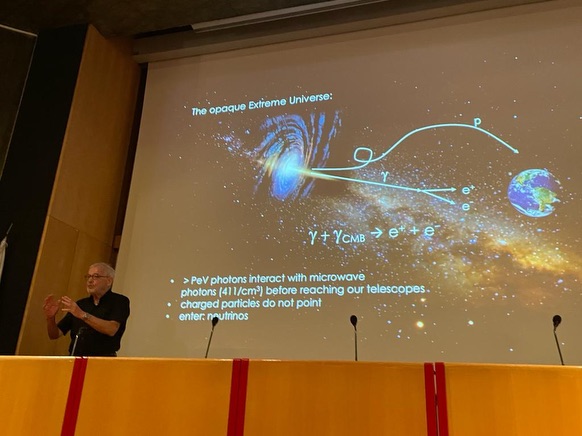 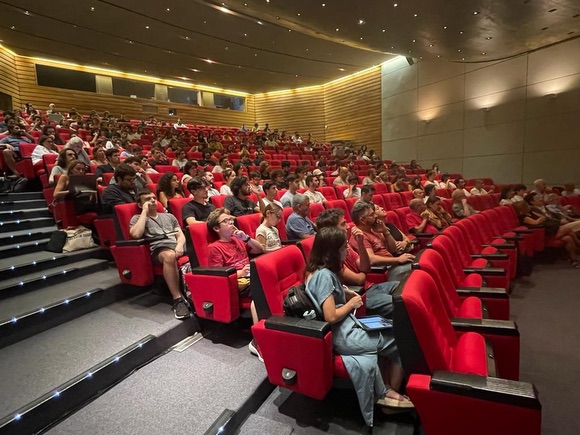
O Professor Halzen é um dos físicos mais prestigiados no domínio
da Física de Partículas e Astropartículas, tendo sido a força motriz das
experiências AMANDA e ICECUBE no Pólo Sul, que abriram uma nova janela de
observação do Universo com a descoberta de neutrinos astrofísicos de alta
energia. O reconhecimento internacional do Professor Francis Halzen é extenso e
reflete-se nos muitos prémios e doutoramentos honorários que recebeu.
Este colóquio foi coorganizado pelo LIP (Laboratório de
Instrumentação e Física Experimental de Partículas), o DF e a sua área
científica de Física de Partículas e Física Nuclear.
| |
|
|
|
| |
Prémio Nobel da Física 2023 e os impulsos attosegundo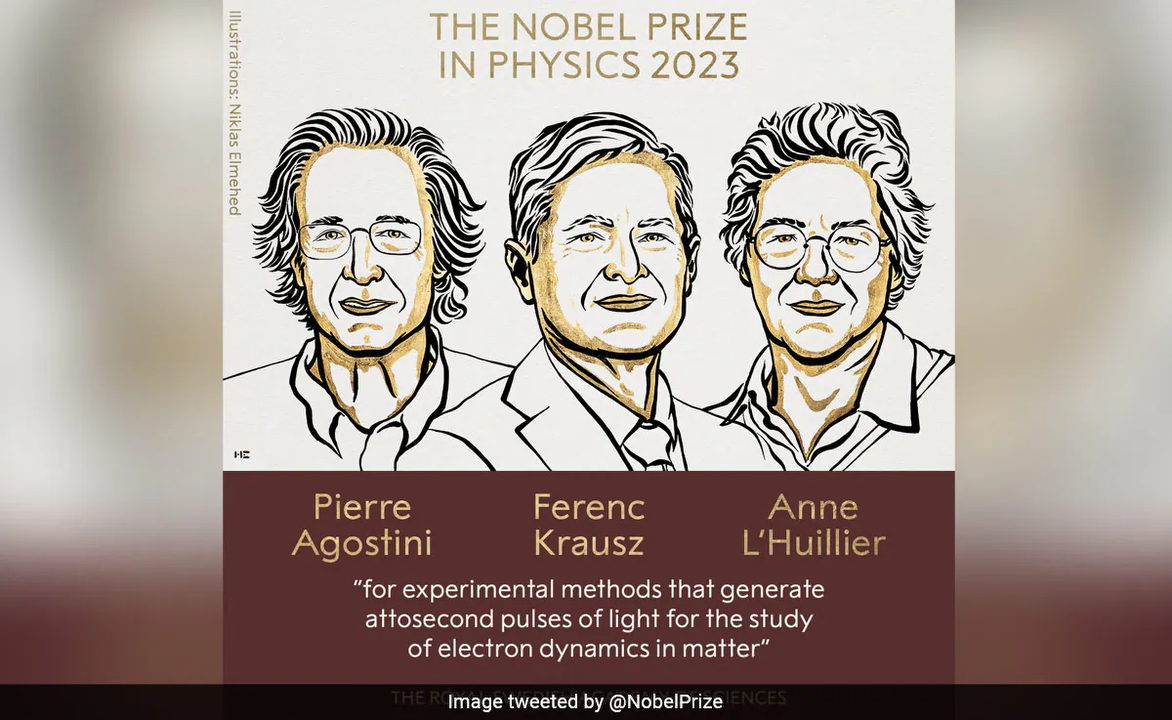
O Prémio Nobel da Física de 2023 foi atribuído a Pierre
Agostini, Ferenc Krausz e Anne L’Huillier pela descoberta de impulsos
attosegundo (10-18 s). Esta nova fonte de luz veio revolucionar todas as medidas de processos ultra-rápidos, permitindo atingir a escala temporal da eletrodinâmica na matéria.
Impulsos attosegundo obtidos pela primeira vez por Anne L’Huillier, que
descobriu que a eficiência da geração de harmónicas elevadas de um laser se
mantinha anormalmente alta até ao domínio dos EUV (esperava-se que, por se
tratar de um efeito não linear, diminuísse exponencialmente com as ordens mais
elevadas). Os impulsos de banda larga assim criados, que hoje vão dos infravermelhos até aos raios-X, são coerentes, em fase com o laser inicial.
Sabendo que a largura de banda de um impulso é o que limita fisicamente a sua
duração, a criação de luz coerente de banda larga veio permitir ultrapassar o
limite dos femtosegundos e chegar aos attosegundos. Agostini criou o
diagnóstico que permitiu medir a duração dos impulsos, e Krausz isolou-os e
utilizou-os pela primeira vez para medir, por exemplo, o campo elétrico de um
laser a oscilar no tempo. Prevê-se que, no futuro, este controlo sobre as
escalas temporais mais curtas do universo seja estendido à opto-eletrónica,
para criar processadores ordens de grandeza mais rápidos do que os
actuais.
No Técnico geramos Harmónicas Elevadas há mais de uma década, que usamos para
fazer imagens de raios-X ultra-rápidas de plasmas densos. Desde 2018, os alunos
do 3º ano da LEFT geram impulsos attosegundo no laboratório
VOXEL, no âmbito da cadeira de Física Experimental em Unidades de
Investigação.
| |
| | Physics@Coffee
A iniciativa Physics@Coffee continua a promover a
investigação do DF, a dar visibilidade aos seus investigadores e facilitar o
contacto com os alunos LEFT/MEFT. Os encontros regulares acontecem todas as
quintas-feiras às 17h na sala de seminários de DF (durante as semanas letivas),
onde alunos e investigadores conversam sobre temas de Física. Os temas
explorados nos Physics@Coffee durante o primeiro período letivo 23/24 foram:
- 14/09: Ultrafast Physics (Física de Plasmas, Lasers e Fusão Nuclear)
- 21/09: Neutrinos (Física de Partículas e Física Nuclear)
- 28/09: Numerical Relativity (Astrofísica e Gravitação)
- 12/10: Nanophotonics (Física da Matéria
Condensada e Nanotecnologias)
- 19/10: From Plasmas to cold matter (Física de Plasmas, Lasers e Fusão Nuclear)
- 26/10: The origin of matter (Física de Partículas e Física Nuclear)
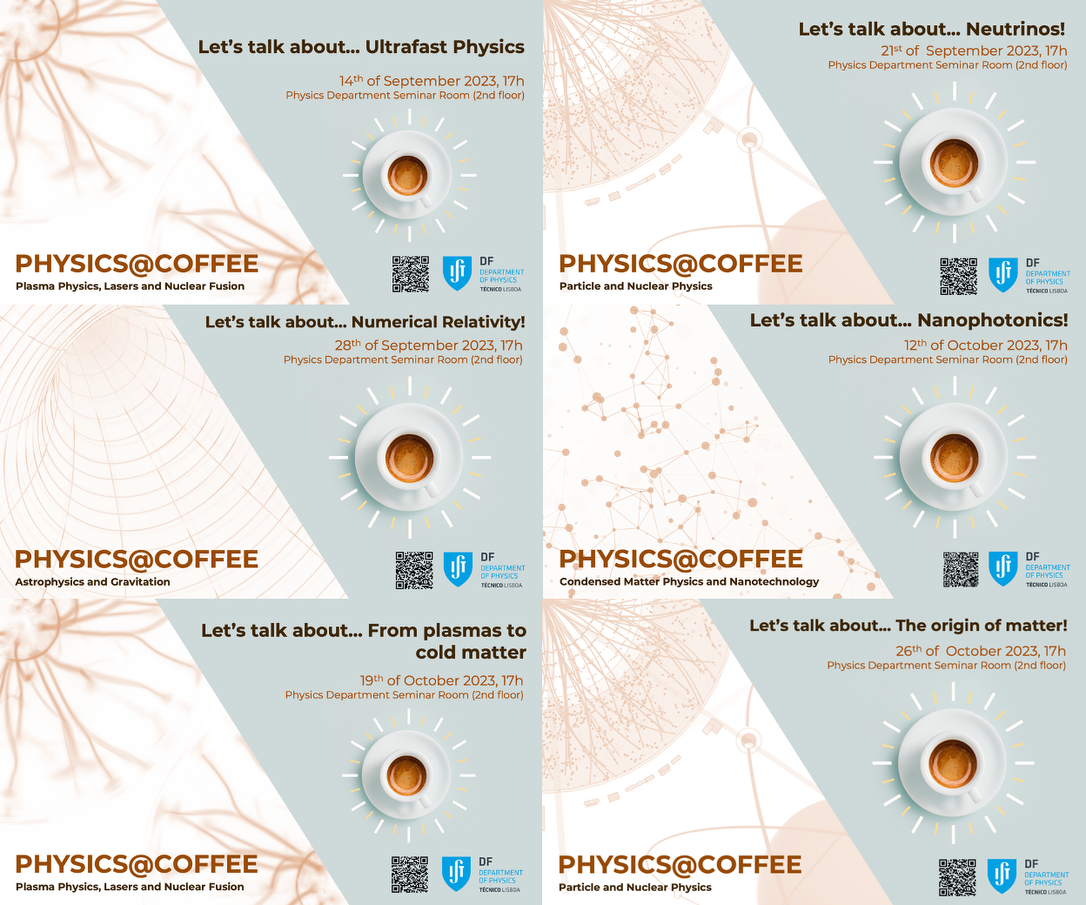
Para sugestões de
temas a discutir em futuros Physics@Coffee, e/ou divulgação de eventos na
página do DF e nas redes sociais, contactar:
- Professor David Hilditch (Astrofísica e Gravitação)
- Professor João Figueirinhas (Física da Matéria Condensada e Nanotecnologias)
- Professor Pedro Abreu (Física de Partículas e Física Nuclear)
- Professor Gonçalo Figueira (Física de Plasmas, Lasers e Fusão Nuclear)
Pedimos também aos colegas presentes nas sessões do Physics@Coffee que, sempre que possam, tirem algumas fotos e nos enviem para divulgação. | |
|
|
|
| | Nov@s alun@s LEFT 2023/2024
No passado dia 11 de Setembro, a coordenação LEFT/MEFT e o DF receberam os novos alunos da LEFT 2023/2024. À semelhança dos anos anteriores, a LEFT preencheu todas as vagas, continuando a assegurar uma nota mínima de entrada muito alta - a mais elevada do País em comparação com cursos congéneres. A LEFT mantém-se como um curso de referência do Técnico para excelentes alunos, atraindo estudantes talentosos e altamente motivados de todo o país. Desejamos a todos os novos alunos muito sucesso nesta nova etapa do seu percurso académico. 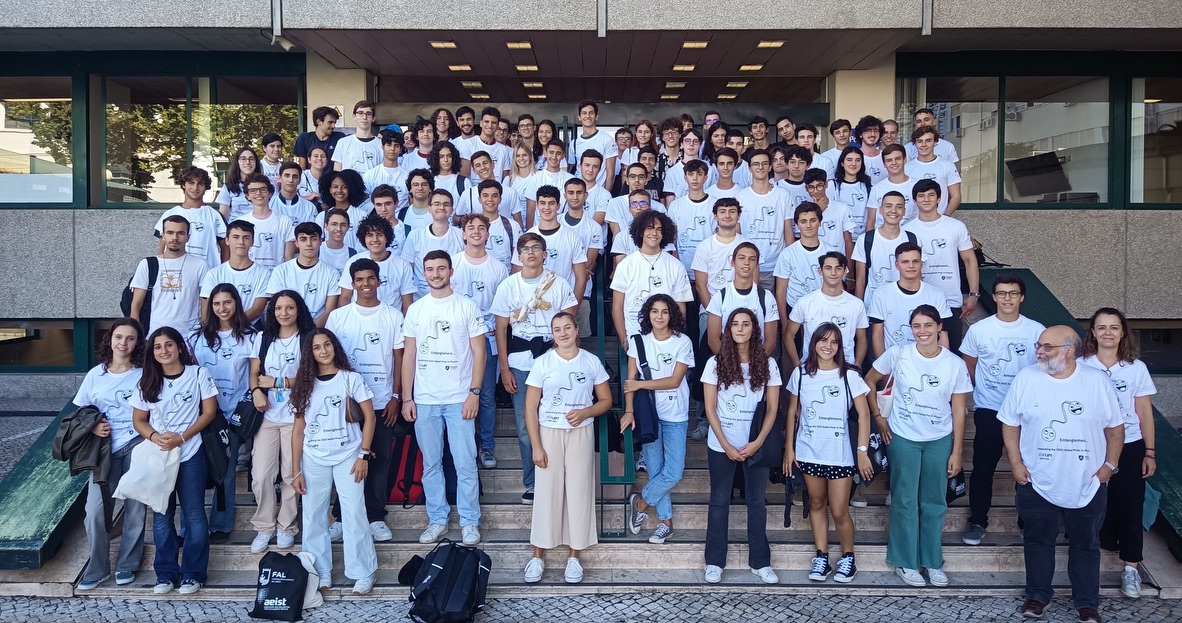
Como tem vindo a ser tradição nos últimos anos, a coordenação da LEFT/MEFT oferece aos novos alunos uma t-shirt alusiva ao tema do Prémio Nobel da Física do ano anterior. Em 2022, o mesmo foi atribuído a Aspect, Clauser e Zeilinger pelos seus trabalhos com fotões entrelaçados e pelos contributos pioneiros para a ciência da informação quântica. Este ano, o desenho da t-shirt (ver em baixo) foi da autoria do Professor Luis Melo, atual coordenador d@ LEFT/MEFT. 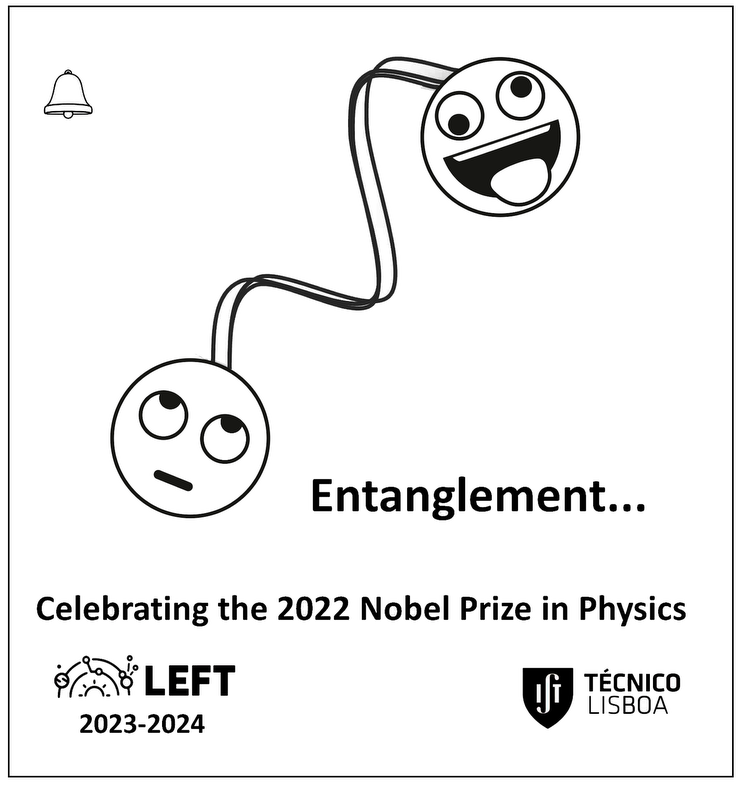
| |
|
|
|
| |
Pulsar Edição 43
A nova Edição do Pulsar (#43) foi lançada no mês passado pelo NFIST e a versão eletrónica pode ser consultada aqui . Os temas tratados nesta edição são muito variados: desde os motores caseiros até à matéria escura, passando pelo bosão de Higgs, os 30 anos do GoLP, e a história da Física de Partículas em Portugal. | | | |
| | 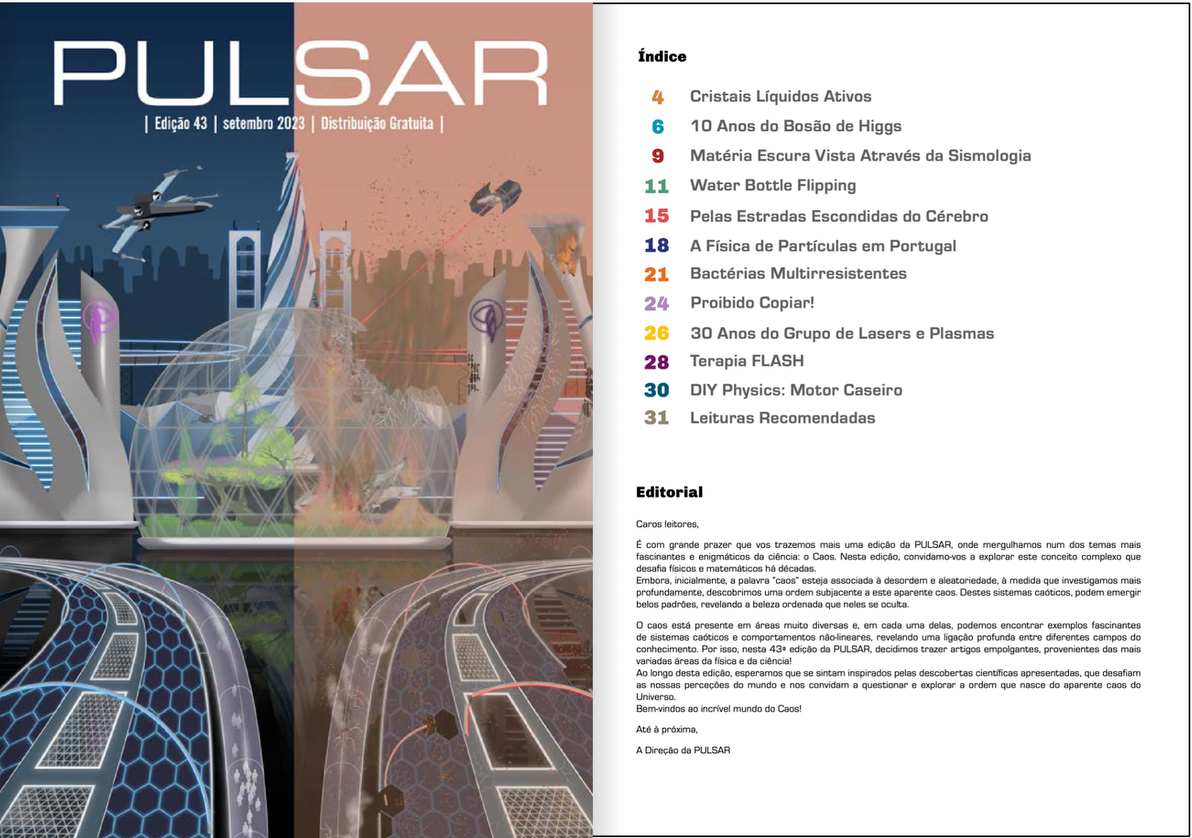 | | | |
| |
Acolhimento dos novos Colaboradores Docentes do DF para 2023/24
No presente ano letivo, o DF, com o apoio do IST, contratou um total de
64 Colaboradores Docentes: Monitores, Assistentes e Colaboradores Externos
(alunos de doutoramento com creditação de ECTS). Estes colaboradores estão já a prestar apoio no ensino do DF aos vários cursos do IST.
A reunião de acolhimento dos novos Colaboradores Docentes do DF decorreu
no dia 5 de Setembro e contou com a presença dos coordenadores da LEFT/MEFT
e dos dois programas doutorais do DF, vários colegas em representação do DF, de
alguns Colaboradores Docentes que exerceram funções no ano passado e ainda do
Núcleo de Desenvolvimento Académico. Na reunião foi apresentado o documento de enquadramento do serviço dos
Colaboradores Docentes, elaborado pelo DF. Neste encontro, professores e colaboradores docentes do ano anterior partilharam experiências e esclareceram questões pertinentes sobre o desempenho dos novos colaboradores que iniciaram as suas funções este ano. 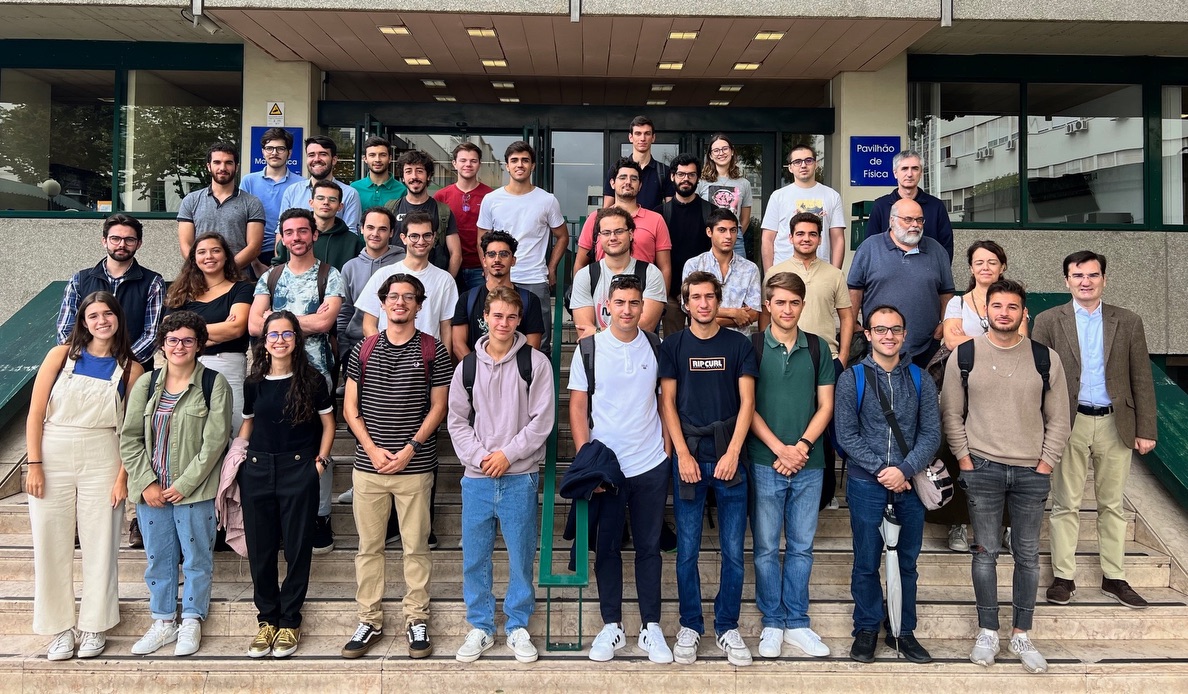
| |
| |
Apresentação do enquadramento do serviço de colaboradores docentes DF ao Conselho Pedagógico
Com o propósito de facilitar a integração de
alunos nas atividades de docência, a comissão executiva do
DF, conforme é do vosso conhecimento, elaborou um documento
destinado a enquadrar o serviço do pessoal
especialmente contratado no quadro docente do DF.
A Professora Teresa Peña, Presidente do
Conselho Pedagógico do IST (CP), convidou a direção do DF a apresentar o
referido documento ao CP. A mesma decorreu no dia 20 de Julho e contou com a
presença do Presidente do DF, Professor Ilídio Lopes, do Vice-Presidente
responsável pela Distribuição do Serviço Docente, Prof.
Filipe Mendes, e do Assessor para os 1º, 2º e 3º ciclos de estudos, Engenheiro
Rafael Almeida. Os membros do CP receberam a proposta de uma forma muito
positiva.
| |
|
|
|
| |
Physics@Técnico agora também no Instagram
À semelhança da já existente página no Facebook Physics@Técnico, o DF está agora
presente no Instagram. Este novo canal de comunicação permitirá divulgar de uma forma mais eficaz a investigação e os eventos do DF não só
junto da nossa comunidade mas também no exterior. Convidamos todos os colegas e alunos a seguirem as nossas redes sociais (links
nas imagens em baixo). Contamos com a colaboração de todos para enriquecer os
conteúdos das mesmas. Para envio de sugestões de divulgação (eventos
a realizar ou já realizados, notícias importantes do mundo da Física,
curiosidades, etc...) enviar informação por mensagem direta no Instagram.  
| |
| | Obras de adaptação do espaço para os novos laboratórios de Física
Arrancou o processo da obra de adaptação do espaço para os novos laboratórios de física do IST, que vão ficar situados no piso 0 do Pavilhão da Matemática (ainda a ser usada como refeitório). Foi realizada uma consulta prévia a diversas empresas para elaborarem o projeto de engenharia. Este concurso encerrou recentemente, tendo sido recebido duas propostas. A Comissão de Trabalho para Análise e Implementação dos Laboratórios de Ensino da Física Experimental (COM-FEx) tem vindo a trabalhar ativamente na definição das dezenas de experiências, assim como no planeamento e orçamentação dos equipamentos que irão ocupar o novo espaço. O orçamento atualizado e o processo da sua aquisição estão em discussão com os Órgãos Centrais. Prevê-se que o processo de aquisição dos equipamentos comece em breve, com a expectativa de que a completa instalação dos laboratórios se estenda por 3 anos, distribuída em 3 fases. Em todo este procedimento, seja na definição das experiências ou na seleção de equipamentos, a COM-FEx tem podido contar com o valioso contributo das unidades de investigação das várias áreas científicas do DF. Pretendemos reforçar esta colaboração, pois consideramos esta parceria fundamental para o bom sucesso deste projeto.
Relativamente ao espaço no Piso -1, que se destina a um laboratório de projetos para UCs pré-major e de 2.º Ciclo, a COM-FEx já discutiu e entregou ao Gabinete de Obras o estudo preliminar com as suas necessidades, características e layout. Por fim, no Piso -2, já se iniciaram os trabalhos de reorganização dos espaços de apoio técnico para o desenvolvimento de experiências, manutenção e armazenamento de equipamento. Este trabalho está a cargo da equipa de apoio do DF, composta pelo Daniel Lála, Helder Carvalho e Pedro Claro. Caso tenham algum contributo a oferecer ou necessitem de esclarecimentos, podem contactar o presidente da COM-FEx, o Professor João Mendanha Dias. | |
|
| | |
|
| |
Processo de procura de potenciais candidatos a docentes do DF
No âmbito da iniciativa promovida pelo Conselho
Científico (CC) do Técnico, que visa a futura abertura de vagas docentes nos
diversos departamentos, o DF lançou um pedido de expressão de interesse a nível
internacional direcionado a investigadores e/ou professores potencialmente
interessados em integrar o nosso corpo docente no futuro. É com interesse que
sublinhamos a expressiva participação da comunidade científica internacional
nesta iniciativa, que resultou na submissão de 60 dossiers completos,
refletindo assim a atractividade do nosso departamento. As expressões de
interesse recebidas cobrem as quatro áreas científicas do DF. A nível global,
salientamos os seguintes indicadores: 18% dos candidatos são do género
feminino; 20% são de nacionalidade portuguesa; 18% são docentes já
estabelecidos em busca de novos desafios; 26% têm ou tiveram uma ligação prévia
ao IST e 8% realizaram o seu doutoramento no IST.
Beneficiando da cooperação das suas áreas
científicas, e em conformidade com as diretrizes aprovadas pelo CC em 28 de
Julho de 2021 sobre o "Processo de Procura Aberta de Potenciais
Candidatos", o DF avançará com a elaboração dos dossiers para envio ao CC,
em colaboração com a Comissão de Gestão de Lugares. Estes dossiers
fundamentarão a proposta para atribuição de novas posições docentes ao DF.
Segundo o calendário proposto pelo CC, antecipa-se que a publicação dos novos concursos
em Diário da República ocorra no início do Verão.
Informações sobre a calendarização dos processos de recrutamento e
valorização estão disponíveis nesta página do Conselho
Científico do Técnico e neste documento.
Expressamos o nosso agradecimento aos colegas do
Departamento de Física pela significativa divulgação desta iniciativa. A vossa
colaboração é essencial para um recrutamento bem-sucedido e é fundamental para
o desenvolvimento do nosso Departamento.
| |
| |
Próximos colóquios do DF- 15 Novembro (16h, PA1): "Uma breve
história dos lasers e plasmas no IST e no GoLP”, Professor Luís Oliveira e Silva
(Instituto de Plasmas e Fusão Nuclear - IPFN - e Instituto Superior Técnico)
- 4 Dezembro (16h30, sala a anunciar): “Título a anunciar”, Professor Ricardo Galvão (CNPq, Conselho Nacional de Desenvolvimento Científico e Tecnológico, Brasil).
- 15 Dezembro (11h,
PA1): "Plasmas in the semiconductor industry: modern trends,
opportunities and diversity”, Professor Gerrit Kroesen (Applied Physics
and Science Education, Eindhoven University of Technology - TU/e, The
Netherlands). Organizado em colaboração com o IPFN.
| |
|
| | |
|
| |
Calendário do DF (Próximos Eventos)- Plenário
do DF (31 de Outubro, 11:30h, anfiteatro PA1)
- Almoço Convívio (31
de Outubro, 13h, sala P12) para todos os docentes, investigadores e
funcionários não docentes do DF (para participantes registados).
- Festa
de Natal para toda a comunidade DF no dia 16 de Dezembro
(Sábado). Marquem nas vossas agendas!
| | | |
|
|
|
| | IST Distinguished Lecture
On the 9th of October, Professor Francis Halzen, Vilas Research Professor and Gregory Breit Professor at the University of Wisconsin-Madison, presented the lecture entitled “Opening a New Window on the Universe from the South Pole” in the Auditorium Abreu Faro at IST. The talk was followed by a lively discussion session.
 
Professor Halzen is one of the most prestigious physicists in
Particle and Astroparticle Physics, and he has been the driving force behind
the AMANDA and ICECUBE experiments at the South Pole, which opened a new
observation window to the Universe with the discovery of high-energy
astrophysical neutrinos. The international recognition of Professor Francis
Halzen is extensive and reflected in the many awards and Honorary Doctorates he
has received.
This
colloquium was co-hosted by LIP (Laboratório de Instrumentação e Física
Experimental de Partículas), the DF (Physics Department) and its scientific
area of Particle Physics and Nuclear Physics.
| |
|
|
|
| |
Physics Nobel Prize 2023 and the attosecond pulses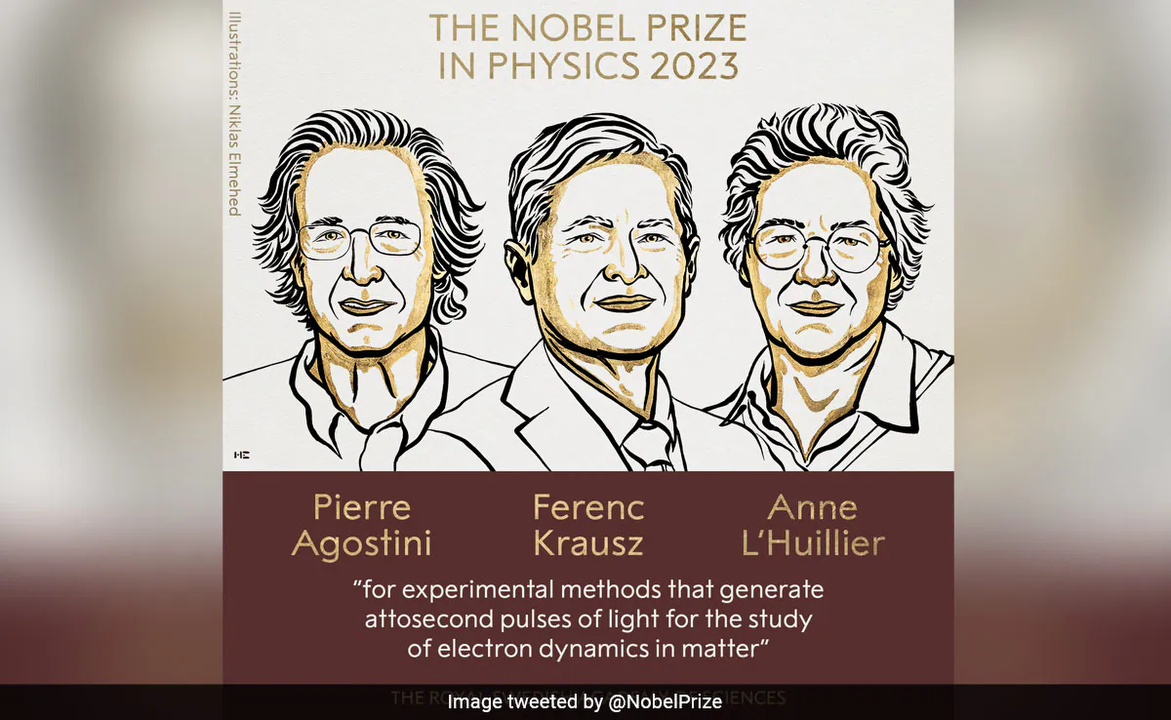
The 2023 Nobel Prize in Physics was awarded to Pierre Agostini, Ferenc Krausz and Anne L'Huillier for their discovery of attosecond pulses (10-18 s). This new light source has revolutionised all measurements of ultrafast processes, making it possible to reach the time scale of electrodynamics in matter. Attosecond pulses were obtained for the first time by Anne L'Huillier, who discovered that the efficiency of a laser's high harmonic generation remained abnormally high up to the EUV domain (being a non-linear effect, it was expected that it would decrease exponentially with higher orders). The broadband pulses thus created, which today range from infrared to X-rays, are coherent in phase with the initial laser. Knowing that the bandwidth of a pulse is what physically limits its duration, the creation of broadband coherent light made it possible to go beyond the femtosecond limit and reach attoseconds. Agostini created the diagnostic that made it possible to measure the duration of pulses, and Krausz isolated them and used them for the first time to measure, for example, the electric field of a laser oscillating in time. It is expected that in the future, this control over the shortest time scales in the universe will be extended to optoelectronics, to create processors orders of magnitude faster than the current ones. At IST we have been generating High Harmonics for over a decade, which we use to make ultrafast X-ray images of dense plasmas. Since 2018, third-year LEFT students have been generating attosecond pulses in the VOXEL laboratory as part of the Experimental Physics in Research Units course.
| |
| | Physics@Coffee
The Physics@Coffee initiative continues to promote DF research, giving visibility to its researchers and facilitating contact with LEFT/MEFT students. Regular meetings take place every Thursday at 5pm in the DF seminar room (during school weeks), where students and researchers talk about Physics topics. The themes explored in Physics@Coffee during the first academic period 23/24 were: - 14/09: Ultrafast Physics (Plasma, Laser and Nuclear Fusion Physics)
- 09/21: Neutrinos (Particle Physics and Nuclear Physics)
- 09/28: Numerical Relativity (Astrophysics and Gravitation)
- 12/10: Nanophotonics (Condensed Matter Physics and Nanotechnologies)
- 19/10: From Plasmas to cold matter (Plasmas Physics, Lasers and Nuclear Fusion)
- 26/10: The origin of matter (Particle Physics and Nuclear Physics)

To suggest topics
for future Physics@Coffee, and/or requests for dissemination of events/news on
the DF page/social networks please contact:
- Professor David Hilditch (Astrophysics and Gravitation)
- Professor João
Figueirinhas (Condensed Matter Physics and Nanotechnologies)
- Professor Pedro Abreu (Particle Physics and Nuclear Physics)
- Professor Gonçalo Figueira (Plasma Physics, Lasers and Nuclear Fusion)
We also ask our colleagues to take some photos during Physics@Coffee whenever possible for future dissemination.
| |
| | New students LEFT 2023/2024
On September 11th, the LEFT/MEFT and the DF coordinators welcomed the new LEFT 2023/2024 students. As in previous years, LEFT managed not only to fill all vacancies but also to ensure a very high minimum entry grade, which continues to correspond to an outstanding group of students. We wish all new students much success in this new stage of their academic journey.

As has become tradition in recent years, the LEFT/MEFT coordination offers new students a t-shirt alluding to the theme of the previous year's Nobel Prize in Physics. In 2022, it was awarded to Aspect, Clauser and Zeilinger for their work on entangled photons and pioneering contributions to the science of quantum information. This year, the t-shirt design (see below) was done by Professor Luis Melo, current coordinator of LEFT/MEFT.

| |
| |
Pulsar Edition 43
The new Edition of the Pulsar magazine (#43) was released last month by NFIST. The electronic version can be found here . The topics covered in this edition are very varied: from homemade engines to dark matter, including the Higgs boson, the 30th anniversary of the GoLP, and the history of Particle Physics in Portugal. | | | |
| |  | | | |
| |
Welcoming the new DF Teaching Collaborators for 2023/24
In the current academic year, the DF, with the support of IST, hired a total of 64 Teaching Collaborators: Monitors, Assistants and External Collaborators (doctoral students with ECTS accreditation). These collaborators are already providing teaching support to the various IST courses. The welcoming meeting for the new DF Teaching Collaborators took place on the 5th of September and was attended by the coordinators of LEFT, MEFT and the two DF doctoral programmes, several colleagues representing the DF, some Teaching Collaborators who held positions last year and also from the Academic Development Center. At the meeting, the framework document for the Teaching Collaborators service, prepared by the DF, was presented, and experiences and important issues for the performance of new employees who started their duties this year were shared and discussed.
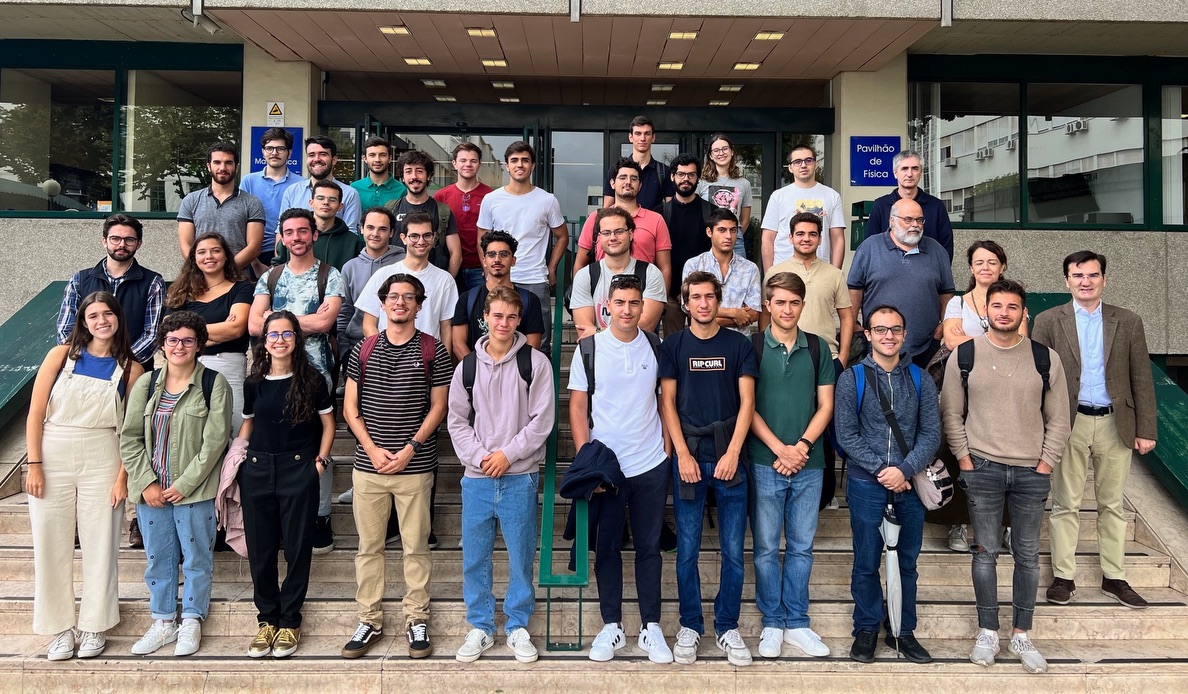
| |
| |
Presentation to the Pedagogical Council of the document setting the framework for teaching collaborator service at DF
With the aim of facilitating the integration of students into teaching activities, as you know, the executive committee of the DF has drawn up a document designed to provide a framework for the service of specially-hired staff in the DF teaching staff. Professor Teresa Peña, President of the IST Pedagogical Council (CP), invited the DF's management to present this document to the CP. This took place on 20 July and was attended by the President of the DF, Professor Ilídio Lopes, the Vice-President responsible for the Distribution of Teaching Services, Professor Filipe Mendes, and the Advisor for the 1st, 2nd and 3rd cycles of studies, Engineer Rafael Almeida. The CP members received the proposal very positively. | |
|
|
|
| |
Physics@Técnico now also on Instagram
Following the already existing Facebook page Physics@Técnico, DF is now present on Instagram. These new communication channels will make it possible to disseminate DF research and events more effectively, not only within our community but also to the outside world. We invite all colleagues and students to follow our social networks (links in the images below). We count on everyone's collaboration to enrich their content. To send promotional suggestions (events to be held or already held, important news from the world of Physics, curiosities, etc...) send information via direct message on Instagram.  
| |
| | Adaptation works on the space for the new Physics Laboratories
Work has begun on adapting the space for IST's new physics laboratories, which will be located on the ground floor of the Maths Pavilion (still being used as a refectory). Several companies were consulted beforehand to draw up the engineering project. This tender closed recently, having received two proposals. The Working Committee for Analysing and Implementing Experimental Physics Teaching Laboratories (COM-FEx) has been actively working on defining the dozens of experiments, as well as planning and budgeting for the equipment that will occupy the new space. The updated budget and the procurement process are currently being discussed with the Central Bodies. The process of acquiring the equipment is expected to begin soon, with the complete installation of the laboratories expected to take three years, spread over three phases.
Throughout this procedure, whether in defining experiments or selecting equipment for research, COM-FEx has been able to count on the valuable contribution of the research units in the various scientific areas of the FD. We intend to strengthen this collaboration, as we consider this partnership to be fundamental to the success of this project.
With regard to the space on Floor -1, which is intended for a project laboratory for pre-major and 2nd cycle courses, COM-FEx has already discussed and delivered the preliminary study with its needs, characteristics and layout to the Works Office. Finally, on Floor -2, work has already begun on reorganising the technical support spaces for experimentation, maintenance and equipment storage. This work is being carried out by the DF support team, made up of Daniel Lála, Helder Carvalho and Pedro Claro.
If you have any contributions to make or need any clarification, please contact the president of COM-FEx, Prof João Mendanha Dias.
| |
| |
Faculty search process
As part of the initiative
promoted by Técnico's Scientific Council (SC), aimed at the future opening of
teaching positions in the various departments, the DF launched a call for
expressions of interest at international level aimed at researchers and/or professors
potentially interested in joining our teaching staff in the future. It is with
interest that we emphasise the significant participation of the international
scientific community in this initiative, which resulted in the submission of 60
complete dossiers, thus reflecting the attractiveness of our department. The
expressions of interest received cover the four scientific areas of the FD.
Overall, the following indicators stand out: 18% of the candidates are female;
20% are Portuguese; 18% are established professors looking for new challenges;
26% have or have had a previous connection to IST and 8% did their PhD at IST. Benefiting from the cooperation
of its scientific areas, and in accordance with the guidelines approved by the
CC on 28 July 2021 on the "Open Search Process for Potential
Candidates", the FD will proceed with the preparation of dossiers to send
to the CC, in collaboration with the Seat Management Committee. These dossiers
will form the basis for the proposal to allocate new teaching positions to the
FD. According to the timetable proposed by the CC, it is anticipated that the
new competitions will be published in the Diário da República at the beginning
of the summer. Information on the timing of the
recruitment and promotion processes is available on this page of Técnico's
Scientific Council and in this document.
We would like to thank our
colleagues in the Physics Department for publicising this initiative so widely.
Your co-operation is essential for successful recruitment and is fundamental to
the development of our Department. | |
| |
Next DF Colloquia- November 15 (16h, PA1): "A brief history of lasers and plasmas at IST and GoLP”, Luís Oliveira e Silva
(IST e IPFN).
- December 4 (16h30, room to be announced): “Title to be announced”, Professor Ricardo Galvão (CNPq, Conselho Nacional de Desenvolvimento Científico e Tecnológico, Brasil).
- 15 Dezembro (11h,
PA1): "Plasmas in the semiconductor industry: modern trends,
opportunities and diversity”, Professor Gerrit Kroesen (Applied Physics
and Science Education, Eindhoven University of Technology - TU/e, The
Netherlands). Organised in collaboration with IPFN.
| |
|
|
|
| |
DF Calendar (Upcoming Events)- DF Plenary meeting (31 October, 11:30am, PA1 amphitheatre).
- Convivial Lunch (31 October, 1pm, room P12) for DF
faculty, researchers and non-faculty staff (for registered participants).
- Christmas Party, Saturday 16 December. Mark your agendas!
| |
|
|
|
|